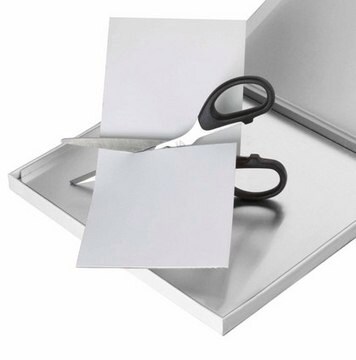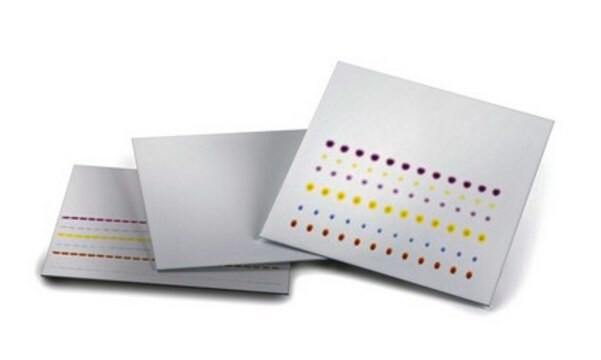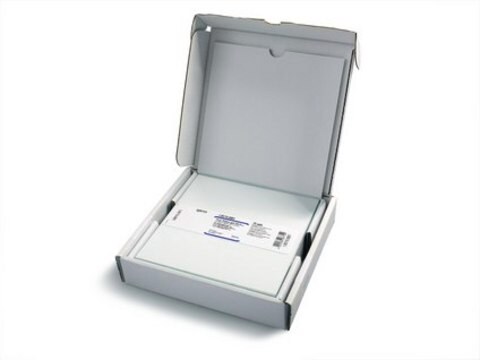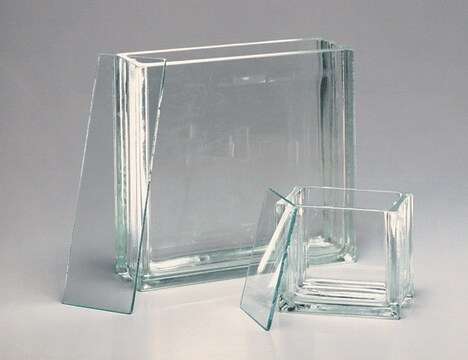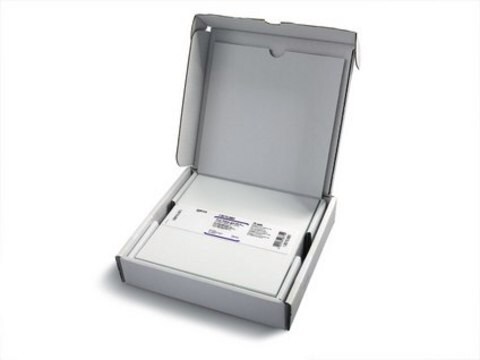1.05577
TLC plastic sheets, Cellulose
pkg of 25 sheets, sheet L × W 20 cm × 20 cm, plastic support
Sign Into View Organizational & Contract Pricing
All Photos(1)
About This Item
UNSPSC Code:
41115711
Recommended Products
material
cellulose matrix
plastic support
Quality Level
feature
binder Organic Polymer
fluorescent indicator: no
packaging
pkg of 25 sheets
technique(s)
thin layer chromatography (TLC): suitable
layer thickness
70-110 μm
sheet L × W
20 cm × 20 cm
storage temp.
2-30°C
Related Categories
General description
25 Plastic sheets 20 x 20 cm
Our Cellulose plates are used to analyze polar substances. An organic sorbent, cellulose is perfect for separating hydrophilic substances by partition chromatography. Typical applications include the analysis of amino acids, carbohydrates, and phosphates as well as nucleic acid and nucleic acid derivatives. We offer cellulose plates in two grades: TLC for conventional and HPTLC for demanding, high-performance separations.
Application
- A colorimetric method for the enzymatic analysis of gases: the determination of ethanol and formaldehyde vapors using solid alcohol oxidase.: This study presents a novel colorimetric method utilizing solid alcohol oxidase for the determination of ethanol and formaldehyde vapors. The technique, employing cellulose TLC plastic sheets, provides an efficient and accurate means of gas analysis in various environments (Barzana et al., 1989).
Linkage
Replaces: 5577-7; 5577
Analysis Note
Layer thickness: 70 - 110 µm
Deviation of layer thickness per plate: ≤ 30 µm
Aminoacid test
hRf-values
- L-serine, amino acid test:
20 - 30
- L-threonine, amino acid test: 29 - 36
- L-alanine, amino acid test: 30 - 40
- L-methionine, amino acid test: 49 - 60
- L-phenylalanine, amino acid test: 59 - 70
- L-leucine, amino acid test: 66 - 76
Typical value determined on a sheet
Eluent: 1-Butanol/ acetone/ acetic acid/ water (35/35/7/23 v/v/v/v) twice developed
Deviation of layer thickness per plate: ≤ 30 µm
Aminoacid test
hRf-values
- L-serine, amino acid test:
20 - 30
- L-threonine, amino acid test: 29 - 36
- L-alanine, amino acid test: 30 - 40
- L-methionine, amino acid test: 49 - 60
- L-phenylalanine, amino acid test: 59 - 70
- L-leucine, amino acid test: 66 - 76
Typical value determined on a sheet
Eluent: 1-Butanol/ acetone/ acetic acid/ water (35/35/7/23 v/v/v/v) twice developed
Certificates of Analysis (COA)
Search for Certificates of Analysis (COA) by entering the products Lot/Batch Number. Lot and Batch Numbers can be found on a product’s label following the words ‘Lot’ or ‘Batch’.
Already Own This Product?
Find documentation for the products that you have recently purchased in the Document Library.
Customers Also Viewed
Our team of scientists has experience in all areas of research including Life Science, Material Science, Chemical Synthesis, Chromatography, Analytical and many others.
Contact Technical Service
